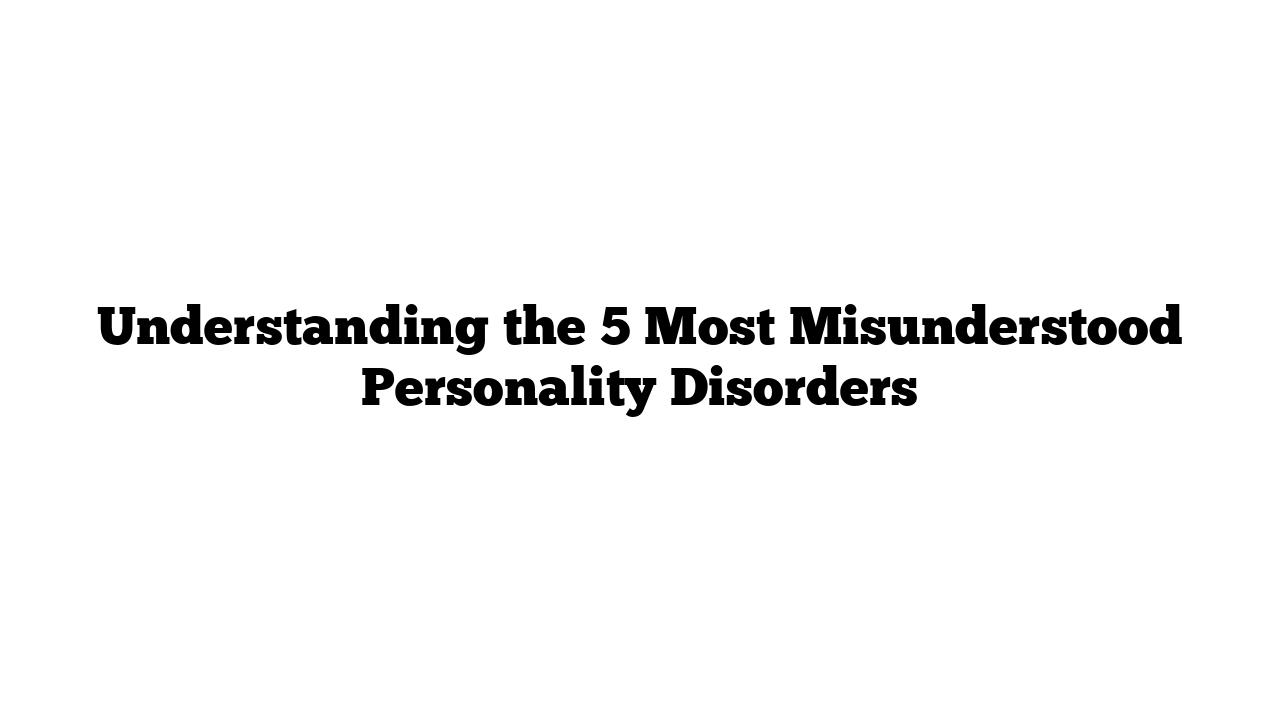The 5 Most Misunderstood Personality Disorders
When it comes to mental health, personality disorders are often surrounded by stigma, myths, and misconceptions. This misunderstanding not only affects those diagnosed but also creates barriers to support and treatment. In this article, we’ll explore five of the most misunderstood personality disorders, breaking them down with clear explanations and helpful insights.
1. Borderline Personality Disorder (BPD)
BPD is often seen as one of the most emotionally intense and misunderstood disorders. People with BPD experience instability in their emotions, relationships, and self-image.
Common Misconceptions:
- “People with BPD are manipulative.”
This myth arises because emotional outbursts or actions may seem dramatic. However, these behaviors stem from genuine fear of abandonment or emotional pain.
Symptoms:
- Intense fear of abandonment
- Rapid mood swings
- Unstable self-image
- Impulsive behaviors
Treatment, such as dialectical behavior therapy (DBT), has been shown to help individuals manage symptoms effectively. If you’re in the USA, many therapists specialize in BPD treatment.
2. Antisocial Personality Disorder (ASPD)
Commonly labeled as “sociopathy,” ASPD is often misrepresented in movies as individuals who lack any morality or kindness.
Reality Check:
- While individuals with ASPD may have difficulty understanding others’ emotions, this doesn’t mean they are always violent or criminal.
Key Symptoms:
- Disregard for societal rules
- Impulsivity
- Lack of empathy
In the USA, programs such as cognitive-behavioral therapy (CBT) have proven to support behavior change in people with ASPD.
3. Narcissistic Personality Disorder (NPD)
Often misunderstood as excessive self-love, NPD is much deeper. It stems from a fragile sense of self-worth that leads to compensatory behaviors.
Myths vs. Facts:
- Myth: “All narcissists are arrogant.”
- Fact: People with NPD often struggle with deep insecurities masked by their behavior.
Symptoms:
- Grandiose sense of self-importance
- Need for constant admiration
- Lack of empathy
While challenging to treat, therapy like psychodynamic approaches helps individuals with NPD develop healthier self-perceptions.
4. Avoidant Personality Disorder (AvPD)
This lesser-known disorder is often confused with social anxiety. People with AvPD have an overwhelming fear of rejection that keeps them isolated.
Symptoms:
- Avoidance of social situations due to fear of criticism
- Feelings of inadequacy
- Extreme sensitivity to negative feedback
Unlike social anxiety, AvPD impacts all areas of life, making everyday interactions daunting. Therapy, particularly exposure therapy, can help individuals gradually face their fears.
5. Obsessive-Compulsive Personality Disorder (OCPD)
Not to be confused with obsessive-compulsive disorder (OCD), OCPD focuses on control and perfectionism.
Common Traits:
- Rigid adherence to rules
- Perfectionism that interferes with tasks
- Difficulty delegating responsibilities
People with OCPD may struggle in workplaces or relationships because they hold themselves—and others—to impossibly high standards. Treatment like cognitive therapy teaches flexibility and mindfulness.
Breaking the Stigma Around Personality Disorders
Misunderstandings often come from lack of awareness. By understanding these disorders better, we can offer support instead of judgment. If you’re interested in mental health resources, visit medicaltimes.io for detailed insights and tips.
Additional Resources
- National Institute of Mental Health (NIMH): https://www.nimh.nih.gov
- Mental Health America (MHA): https://www.mhanational.org
- Psychology Today: https://www.psychologytoday.com
FAQs – Frequently Asked Questions
- What are personality disorders?
Personality disorders are long-term patterns of behavior and thinking that deviate from cultural norms and cause distress or impairment. - Can personality disorders be treated?
Yes, treatment options include therapy, medication, and support groups. - Is BPD the same as bipolar disorder?
No, BPD involves emotional instability linked to relationships, while bipolar disorder is a mood disorder with distinct manic and depressive episodes. - Are people with ASPD always violent?
No, while ASPD involves difficulty following rules, violence is not a universal trait. - What causes personality disorders?
Genetics, trauma, and environmental factors all play a role. - Is AvPD just shyness?
No, AvPD is a clinical disorder involving deep fear of rejection, not simply being shy. - Can children have personality disorders?
Personality disorders are typically diagnosed in adults, as children’s personalities are still developing. - Is OCPD the same as OCD?
No, OCD involves intrusive thoughts and repetitive behaviors, while OCPD focuses on control and perfectionism. - How can I support someone with a personality disorder?
Learn about their condition, be patient, and encourage them to seek professional help. - Where can I find help in the USA?
Resources like medicaltimes.io and MHA can guide you toward finding therapists and support groups in your area.
